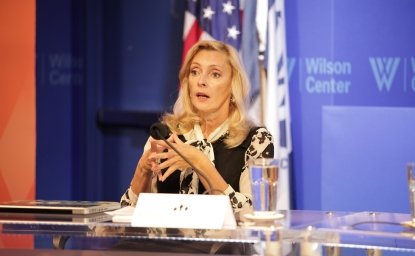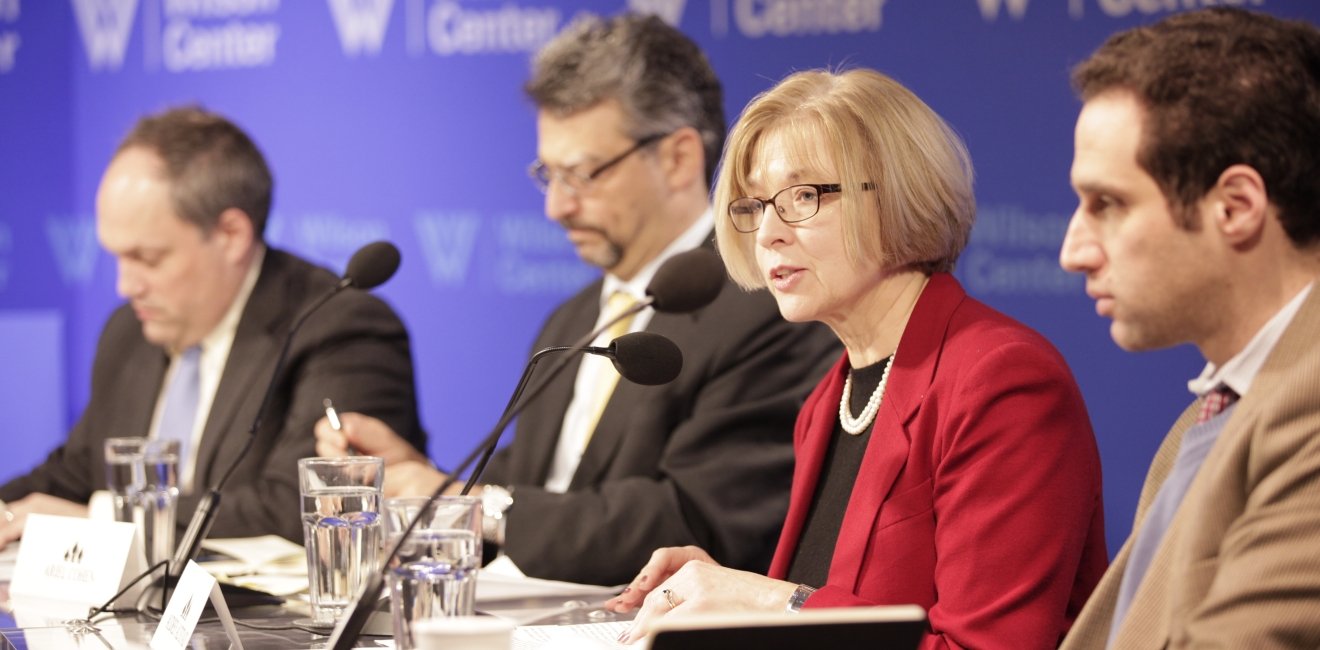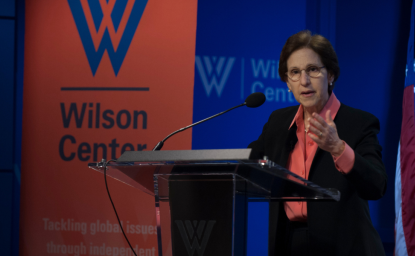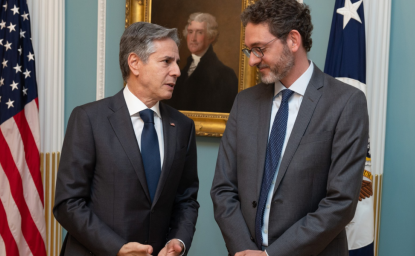
A blog of the Wilson Center
A fellow at the Kennan Institute from September 2014 to May 2015, Audrey L. Altstadt is a history professor and co-director of the Russian, East European, and Eurasian Studies Program at the University of Massachusetts Amherst. An expert on the history, culture, and politics of Azerbaijan, Altstadt is the author of The Politics of Culture in Soviet Azerbaijan, 1920-1940 (Routledge 2016); The Azerbaijani Turks: Power and Identity under Russian Rule (Hoover Institution Press 1992) and Frustrated Democracy in Post-Soviet Azerbaijan (Woodrow Wilson Center Press and Columbia University Press, 2017). She has been a recipient of various grants including from the Harvard Russian Research Center and the US Institute of Peace, and has been a consultant for Freedom House, Oxford Analytica (UK), Radio Liberty, US Department of Justice Immigration and Naturalization Service, the US State Department, the Commission for Security and Cooperation in Europe and other agencies.
Q&A
Q: What issues or topics are you working on currently?
A: Human rights and democratization are major themes of my reading, writing and teaching since my Wilson Center fellowship in 2014-15. These themes loomed large in the book I wrote during that year, Frustrated Democracy in Post-Soviet Azerbaijan, (Wilson Center Press and Columbia University Press, 2017) and they are frighteningly crucial in the world today.
My interests, in part thanks to my Wilson Center experience, go beyond the post-Soviet space to global patterns. Moreover, because of the impact of high-level corruption on governance and national economies, I include it among the issues I try to consider under the rubric of human rights and certainly as part of democracy-building.
Propaganda is also a theme in my work, also in global terms. It is one of several themes in my new book project (see below) on an Azerbaijani émigré in interwar and Cold War Paris. This is a separate topic, but also implicitly related to others including rights and democracy. Information, both historical and current, are now so regularly “falsified” (to use the old Soviet parlance), that I am thinking of something like “freedom from deception” or perhaps access to truth as a human right.
Q: What else have you done since you left the Center?
A: When I left the Center, I spent several months completing the book manuscript and preparing it for publication. I wrote a Kennan Cable (#23 in the Kennan Institute series) on Azerbaijan in the “triangular” relationship of Russia, Turkey and Iran as well as a couple of op-eds each year for The National Interest and other policy-related publications.
Looking ahead, I have begun my next major research project, the political biography of an Azerbaijani émigré in Paris from 1919 until 1962. Jeyhun Hadjibeyli, a journalist, was covertly involved with anti-communist groups in the interwar period and later during the Cold War.
After returning to my post as History Professor at the University of Massachusetts Amherst, I used some of the reading and the discussions of the research process to revise my advanced undergrad seminar “Human Rights and Energy Security.”
Q: Have you found your association with the Wilson Center to be beneficial to your work?
A: Very! The fellowship was not only a great privilege in allowing me to focus on completing my book, but to do that in the company of a host of lively and distinguished scholars. The fellowship and the intellectual environment energized me and helped me take a broader view of the problems I was studying in writing a book on a seemingly narrow topic, “frustrated” democracy in one post-Soviet country. But the problems of democracy, human rights, corruption, energy sector imbalances, repression of civil society, potential for the growth of Islam in a secular society have wide implications which this fellowship allowed me time to explore.
Beyond the year itself, my contacts with other scholars and also policy analysts in private and the public sector continue.
Q: What are your best memories at the center?
A: Among my favorite memories are the regular research-in-progress presentations and the opportunities to talk to specialists in fields different from my own but relevant to my research. For example, I spoke at length with a senior specialist on corruption in Africa, an analyst of energy who had worked in both a major oil company and the Dept of Commerce, and a US Air Force colonel (fresh from White House duty) on military strategy. The list goes on. In how many places is that possible?
Q: Do you have any advice for a student interested in your field?
A: Learn languages! In the field of non-Russians of the USSR (or former USSR) the use of Russian just does not cover all the material, interpretations, cultural understanding and nuance. Even in Russian studies, there is valuable scholarship in French, German and other languages. Americans are notorious for poor language proficiency and it is a great joy to participate in international conferences, move easily among languages and thus scholarly conversations. Languages open doors. Learning them is a terrific investment.
Q: Do you have any upcoming projects or other future plans you can tell us about?
A: Right now I have 3 projects, each in a different stage of planning or writing. The biggest project is a political biography of Azerbaijani émigré Jeyhun Hadjibeyli who went to Paris in 1919 for the Peace Conference as a representative of then-independent Azerbaijan’s new government. The Bolshevik invasion of Azerbaijan in 1920 overthrew the republic and stranded the entire delegation. Hadjibeyli had studied in pre-war Paris and after 1920 worked as a journalist and became a French citizen. He was covertly involved with anti-communist groups in the interwar period and later during the Cold War. So this biography is a window into émigré life in Paris, anti-communism including the émigré connection with Radio Liberty in the 1950s, and even life in occupied Paris for a Muslim, albeit a secular one. Although I have collected lots of material and read much of Hadjibeyli’s own work, there are many archives to be explored including those of Radio Liberty. It’s an exciting project.
Author
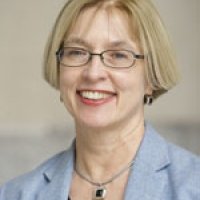
Professor of History, University of Massachusetts, Amherst

Kennan Institute
The Kennan Institute is the premier US center for advanced research on Eurasia and the oldest and largest regional program at the Woodrow Wilson International Center for Scholars. The Kennan Institute is committed to improving American understanding of Russia, Ukraine, Central Asia, the South Caucasus, and the surrounding region through research and exchange. Read more

Explore More in Scholar & Alumni Spotlight
Browse Scholar & Alumni Spotlight
Raul Pangalangan: Bridging Academia, Advocacy, and International Justice
